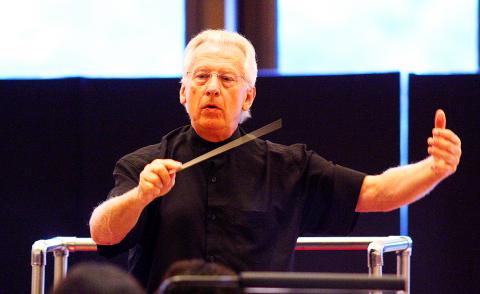In its program tomorrow, the National Symphony Orchestra (NSO, 國家交響樂團) brings together two composers who don’t have much in common.
“There couldn’t be a bigger contrast than Beethoven and Ravel. Sometimes it is very revealing for both composers to be heard so close to each other,” said conductor Gunther Herbig.
The program, titled “Greatness of Beethoven (命運德意志),” features three highly popular works in classical music repertoire. The two by Beethoven are formidable, pointed works about the human condition.

Photo courtesy of NSO
Leonore Overture No. 3 is one of four overtures Beethoven composed for the opera Fidelio. The opera is about the Spanish nobleman Florestan, who is imprisoned wrongfully and then rescued by his wife Leonore, a liberation that is prefigured in Leonore Overture No. 3 by a virtuosic violin passage.
NSO will also play Beethoven’s Fifth Symphony, which weathered a weak premiere in 1808 to become one of the most recognizable pieces of classical music today.
In the way of his overture, the Fifth Symphony and its iconic four-note opening — three Gs and a long E flat — progress from darkness into light, in a dramatic musical shorthand for how victory arrives in the end.
“It is educational on a human level, especially for young people. Everybody meets difficulties and problems in his life. Not to give in, but to stand up again after you have been knocked down and to succeed — this is an incredible message,”
The NSO will present a modified orchestration of doubled woodwinds to compensate for the size of the modern string section, which is larger than Beethoven’s, and for the acoustics of today’s concert hall.
“In Beethoven’s time, they played in much, much smaller halls — halls where you could seat 180 people. Now we have one and a half thousand people in the halls,” he said.
Beethoven’s serious-minded musical drama will be juxtaposed with French composer Ravel’s Piano Concerto in G Major, a light study of musical viewpoints.
Ravel wrote the concerto in the 1920s, when popular music from around the world was reaching the height of influence in Paris’ music scene, said piano soloist Alexandre Tharaud.
Opening with a whip-crack, the concerto’s first movement showcases the bright and balletic interplay of French popular song and jazz idioms, including a direct reference to George Gershwin’s Rhapsody in Blue.
The second movement is suddenly Mozartian, featuring a gentle, clear-voiced melody that is carried the first three minutes by a lone piano.
“Beethoven is always out there addressing the whole mankind. Ravel is much more intimate, much more personal,” Herbig said.
The NSO plays “Greatness of Beethoven” tomorrow in Greater Taichung and Friday at a sold-out show at the National Concert Hall in Taipei.

On April 26, The Lancet published a letter from two doctors at Taichung-based China Medical University Hospital (CMUH) warning that “Taiwan’s Health Care System is on the Brink of Collapse.” The authors said that “Years of policy inaction and mismanagement of resources have led to the National Health Insurance system operating under unsustainable conditions.” The pushback was immediate. Errors in the paper were quickly identified and publicized, to discredit the authors (the hospital apologized). CNA reported that CMUH said the letter described Taiwan in 2021 as having 62 nurses per 10,000 people, when the correct number was 78 nurses per 10,000

As we live longer, our risk of cognitive impairment is increasing. How can we delay the onset of symptoms? Do we have to give up every indulgence or can small changes make a difference? We asked neurologists for tips on how to keep our brains healthy for life. TAKE CARE OF YOUR HEALTH “All of the sensible things that apply to bodily health apply to brain health,” says Suzanne O’Sullivan, a consultant in neurology at the National Hospital for Neurology and Neurosurgery in London, and the author of The Age of Diagnosis. “When you’re 20, you can get away with absolute

May 5 to May 11 What started out as friction between Taiwanese students at Taichung First High School and a Japanese head cook escalated dramatically over the first two weeks of May 1927. It began on April 30 when the cook’s wife knew that lotus starch used in that night’s dinner had rat feces in it, but failed to inform staff until the meal was already prepared. The students believed that her silence was intentional, and filed a complaint. The school’s Japanese administrators sided with the cook’s family, dismissing the students as troublemakers and clamping down on their freedoms — with

As Donald Trump’s executive order in March led to the shuttering of Voice of America (VOA) — the global broadcaster whose roots date back to the fight against Nazi propaganda — he quickly attracted support from figures not used to aligning themselves with any US administration. Trump had ordered the US Agency for Global Media, the federal agency that funds VOA and other groups promoting independent journalism overseas, to be “eliminated to the maximum extent consistent with applicable law.” The decision suddenly halted programming in 49 languages to more than 425 million people. In Moscow, Margarita Simonyan, the hardline editor-in-chief of the